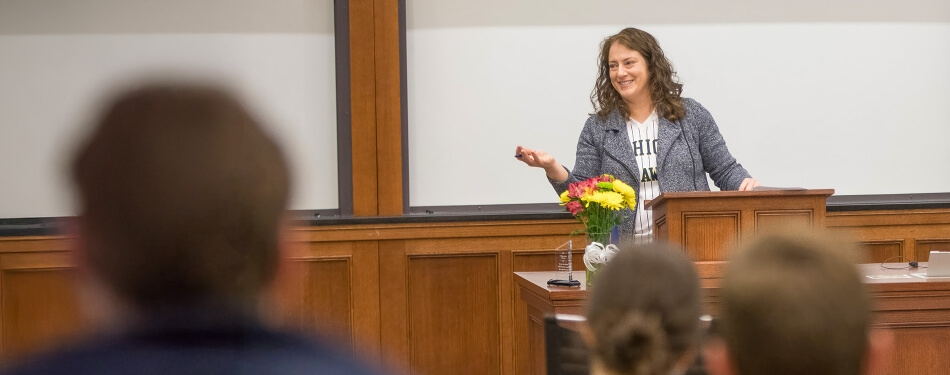You can be a “not great” law student and still have a great career, Kerry Kornblatt told a student audience recently.
Kornblatt, a clinical assistant professor of law, received the 2024 Faculty Award for Dedication to World-Class Legal Practice Teaching, Students, and the Spirit of Michigan Law.
The award, which is given by the Law School Student Senate based on students’ nominations, honors a member of the legal practice faculty who superbly develops their students’ legal research and writing skills.
As part of the award presentation, Kornblatt was invited to give an informal “blue jeans” lecture to the Michigan Law community on a topic of her choosing. In her talk, “Pivots, Safety Nets, and Superpowers: Some Tools for Crafting Your Own (Perfectly Great) Imperfect Legal Career,” Kornblatt shared some of her struggles, triumphs, and lessons learned as a law student and practitioner.
Lesson 1: You don’t have to get your career right right now.
Kornblatt described the academic challenges she experienced in law school and the disengagement she felt as a result. (“I’d give law school a B; it was mutual,” she quipped.)
She acknowledged the pressure that law students can feel to be on a particular path, especially if others around them seem to have their paths secured. But she stressed the commonality of job changes in the legal profession, noting that she has had seven different law jobs in just over two decades of practice.
“Moving around and pivoting is a good thing because you’ll change. Circumstances will change. The only measure, in terms of career planning, that matters is: What works for you? And even within that, it boils down to what works for you in that particular phase of life in that particular moment. So, the task is really a lot smaller than you might envision. And there’s no one checking to see if you’re doing it correctly. No one is keeping track of whether you’ve chosen the most prestigious option.”
Lesson 2: It’s okay to move backward.
Kornblatt told the students that significant setbacks happen to almost everyone at some point and while they can be upending, they’re not career-ending.
She recounted a period of time that felt like her own setback, when she was between jobs. She worried about the permanent damage that the hole in her resume would leave.
But ultimately, she returned to work for a previous employer, which she said gave her the time to figure out what came next in an environment where she and her work were already known and valued.
She encouraged students to use their safety nets amid the twists, turns, and setbacks of their careers: professors, former employers, summer employers, and undergrad professors, among others.
“If there’s a moment when you’re not your best self, or your strongest self, or the one you would want to take to an interview, you can go back to when you were that and lean on the people from that time as resources. Please don’t feel embarrassed or hesitant to call on us.
“Chances are, if you do, you’ll get some support—along with the story from that person about their own setback and who helped them.”
Lesson 3: Identify and harness your superpower.
Kornblatt challenged the audience to think about what they love to do and what they are great at, and then she encouraged them to find ways to leverage that in their career.
“It is not uncommon for law students to feel their self-worth flatten into a few scores or a few qualifications,” she said. “I know that, certainly, I felt that way.
“But there are many different ways to be an attorney and many different ways to be an excellent attorney. If you can look inward and assess what you’re great at, what you love to do when you are most fulfilled, it’s a wonderful guiding force in your decisions about your career and life.”
Kornblatt recounted how she discovered that writing is her own superpower and how it has served her along the way—from a much-needed confidence boost during law school to “very write-y” legal jobs whose experiences built on each other to make new opportunities possible.
Being a legal practice professor brings it all full circle, she said, noting that her own subpar student experience also makes her a better teacher.
“I’ve come around to thinking that my non-amazing law school experience is a sneaky kind of super power for my teaching. For one thing, I can certainly relate to my students when grades come out. And I think it also helps my teaching of writing. When I was working on a really challenging legal problem in my clerkships, I really felt the frustration and the fogginess when the parties didn’t walk through their analysis in a clear way. Reading excellent written legal briefs was, on the other hand, like a breath of fresh air. Over time, I had so many of both experiences that I was able to distill what kinds of qualities were making the good writing good, which were making it accessible to me. Now, I try to translate that for my students.”
Kornblatt concluded by saying that one of the great privileges of teaching is seeing students reveal and/or discover their own superpowers.
“I’ve had students who are amazing writers from the beginning, and that’s amazing to see. I’ve had others who, let’s say, writing is not necessarily the core of their strength. But then when we get to oral argument, they stand out.
“Some of you may still be in the process of discovering your superpower, honing your superpower, and that’s just fine. I hope that what you understand today is that you’ll have the time that you need.”







